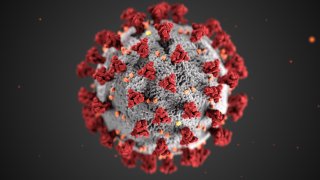
A new strain of the coronavirus, CAL.20C, may be contributing to the acceleration of the recent surge of cases across Southern California, according to a study released this week.
The strain, which the investigators designated as CAL.20C, is believed to be in part responsible for the dramatic increase in cases over the last two months. The findings from researchers at Cedars-Sinai did not indicate whether the strain is more deadly than other current forms of the coronavirus.
“It’s one to watch, but it’s very unclear if it's more transmissible or whether it’s been driven up in frequency because of founder effects and/or biases," Kristian Andersen, a professor in the department of immunology and microbiology at Scripps Research Institute in San Diego, said in a statement released Wednesday. "The virus mutates all the time and some variants will increase in frequency (sometimes rapidly) due to biases in sequencing, biases in sampling, nearby superspreading events and founder effects. It’s unclear where this particular variant falls in that whole picture."
Andersen led the team at Scripps Research that detected, in San Diego, one of the first cases of B.1.1.7 -- also known as the U.K. variant -- in the United States.; He told the New York Times that it's not yet known if the variant found in California has some sort of advantage biologically or is becoming more prevalent simply some sort of statistical anomaly.
Anderson also said that researchers should not necessarily assign blame for any surges on "functional changes in the variants" when, in fact, most of the spread could be stopped by social distancing, large scale testing and screening, avoiding congregant settings, and, of course, wearing a mask.
CAL.20C is distinct from the B.1.1.7 version that is also spreading in the U.S. and is believed to be highly transmissible.
Local
In Southern California, B.1.1.7 has been found in scattered coronavirus cases in Los Angeles, San Diego and San Bernardino counties. In contrast, the CAL.20C strain was identified in 36.4% of cases in the Cedars-Sinai study.
CAL.20C includes a virus variant the California Department of Public Health reported Sunday based on data submitted by Cedars-Sinai and other investigators.
This variant, dubbed L452R, is one of five recurring mutations that constitute the CAL.20C strain, which is propagating across the country, starting in Los Angeles County.
“The recent surge in COVID-19 positive cases in Southern California coincides with the emergence of CAL.20C,” said Dr. Eric Vail, assistant professor of pathology and director of molecular pathology in the Department of Pathology and Laboratory Medicine at Cedars-Sinai.
Vail is the co-corresponding author of the study, submitted to MedRxiv.org, an online archive for health science manuscripts that have not been peer-reviewed, while simultaneously submitted for peer-review on Thursday.
"We're still learning a lot about what the [L452R variant] means, working hard with the tremendous genomic sequencers at institutions like UCSF and Scripps and other places across the state, working with the CDC and our local public-health partners to continue determining what the role of this variant has been in our transmission rates across the state," Dr. Mark Ghaly, the secretary of the California Health & Human Services agency, said on Tueday in his weekly coronavirus update.
Ghaly said the variant was first identified last year is several other countries and states, including California.
"We know that it was recently identified in several large outbreaks in Santa Clara County -- some of those outbreaks in the congregant-care facilities that we know are prone to having broad and large outbreaks," Ghaly said, adding that researchers are trying to determine if it is, in fact, more infectious, and what it's impact might be on vaccinations.
Ghaly stressed his concern about the emergence of the new variants.
"The concern with variants of all varieties is that it changes the behavior of the virus," Ghaly said on Tuesday. "We see mutations in viruses all the time. RNA viruses are notorious and known to have mutations even more than other viruses. So, the point is: Are they important variants, right? Do they have affect the level of infectiousness? Do they affect virulence, the level, the severity of disease? We continue to learn as much as we can as quickly as we can … so far, I don't have any additional news on the variant that … was here in California."
Investigators using publicly available databases have also detected the CAL.20C strain in multiple recent patient samples in Northern California, New York, Washington, D.C. and Oceania.
To identify the CAL.20C strain, the Cedars-Sinai investigators examined SARS-CoV-2 virus samples from 192 patients at Cedars-Sinai who tested positive for coronavirus between Nov. 22 and Dec. 28, 2020.
Using an advanced technique known as next-generation sequencing, they analyzed the genes of the viruses. They combined this data with 4,337 gene profiles of SARS-CoV-2 viruses obtained from patients throughout Southern California, also using publicly available databases.
While the CAL.20C strain was almost nonexistent in October, by December, 36.4% of virus samples from Cedars-Sinai patients were determined to be the strain, as were 24% of all samples from Southern California, defined by Imperial, Kern, Los Angeles, Orange, Riverside, San Bernardino, San Diego, San Luis Obispo, Santa Barbara and Ventura counties.
“The double-digit prevalence of the CAL.20C strain in November and December was striking given that it was first observed in July 2020 in just one of 1,230 virus samples in Los Angeles County and had not again been detected in Southern California until October,” said Jasmine Plummer, research scientist at the Cedars-Sinai Center for Bioinformatics and Functional Genomics, associate director of the Applied Genomics, Computation & Translational Core at Cedars- Sinai and the other co-corresponding author.
Wenjuan Zhang, assistant professor in the department of pathology and laboratory medicine at Cedars-Sinai and first author of the study, said the research team is “not sure what the new findings mean in terms of the infectivity and antibody resistance of the CAL.20C strain, which is important for follow-up studies that will need to be completed.”



